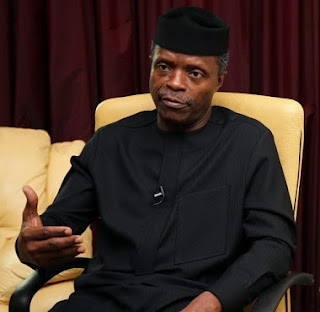Written by the Editorial Board of The Guardian Newspaper
As Nigeria’s current leadership continues to fight corruption , a scourge that has diminished the country on all fronts, Vice President Yemi Osinbajo’s anger and determination to speak out against corruption as often as possible should be appreciated as a necessary cry from the heart. He has passionately spoken on the tragedy of endemic corruption in the civil service and, as if to underscore how almost all Nigerians aid and abet the menace, when not directly engaged in the crime, he has appropriately drawn the attention of the citizens to the danger of celebrating in whatever form those who are known to have looted the treasury.
It is truly unfortunate that people accused of corruption are celebrated in the communities by their kith and kin for having taken ‘a share of the national cake’ and this warped sense of values, of course, is a disservice to the nation and “Today someone who is corrupt is celebrated. There is a problem that we must resolve, and if we don’t resolve it, it will hurt us very, very badly, just as it is hurting us already,” Osinbajo said.
The Vice President, who spoke while opening a two-day National Dialogue on Corruption, organised by the Office of the Vice President in collaboration with the Presidential Advisory Committee Against Corruption (PACAC) also noted that the best way to win the war against corruption is to study the models used elsewhere and adopt them.
Certainly, corruption thrives where it is allowed to thrive. And celebrating or decorating apparently corrupt elements in the society is one way of allowing the scourge to thrive, an absolute confirmation of the Shakespearean saying that, “any mercy that forgives a murderer encourages murder.”
Meanwhile, the once celebrated Lagos State model of fighting corruption through carrot and stick methods that was discussed in the keynote on the occasion is worth considering. Specifically, it was recalled that when the Vice President initiated reforms aimed at curbing graft in the judiciary as Attorney-General of Lagos State in 1999, he was accused of ethnicity and witch-hunt, but was not deterred.
Among the problems addressed then was the mode of appointment of judges that was changed from the usual favouritism and cronyism-driven one to a new merit-based system. Also addressed was the problem of judges’ welfare. Judges were then paid N67,000 per month in Lagos State, an income which could not meet their basic needs and thereby exposed them to temptations.
Then, all of that changed under the supervision of Osinbajo, as Attorney General of Lagos State. The Bola Tinubu-led administration gave every judge a house for life, and increased their remuneration considerably, which became a reference point for other states and the appellate courts. With their needs met, the cudgel was then wielded with total moral indignation on any judge who dared commit the slightest infraction
That judicial reform led to the sack of 22 corrupt magistrates and three judges within one year. A 2016 survey showed zero per cent corruption in the Lagos judiciary, as against 89 per cent in 2006.
With a system in place, impunity was curbed. Which is why it is more important that models that will work through institutional frameworks should be adopted in addition to naming and shaming corrupt people in the society.
Instead of loud media trials without diligent prosecution as is being noticed now, the legislature, the judiciary and the executive should forge models that must work for the common good.
It was fitting that the Chief Justice of Nigeria (CJN) who was at the Dialogue admitted that “a few bad eggs exist within the judiciary” but restated his commitment to collaborating with other arms of government to fight the scourge.
Certainly, it is no longer enough to lament how the military intervention in politics in 1966 institutionalised corruption in the polity. It is time for the leaders of today to dismantle the monster through legal and institutional frameworks that will make it impossible for corruption to thrive. Besides, traditional rulers should stop giving chieftaincy titles to dubious characters who parade wealth without work in their domains.Similarly, news media organisations must desist from encouraging corruption through dubious awards to businessmen and politically exposed persons whose contributions are, at best, still under scrutiny, if not outright questionable.
Today’s awardees may be convicts tomorrow. And that will pose a moral dilemma to the media. Nigeria is a case in point when it comes to why Africa is not rising. Africa’s once biggest oil producer gets more than 90 per cent of its foreign earnings and two-thirds of its tax revenue from oil exports. Yet that hydrocarbon bounty has been a mixed blessing, no thanks to massive official corruption.
Billions of dollars in oil revenues have become a tempting pot of money for politicians and other unscrupulous people. A 2012 report said corruption had gulped a whopping $37 billion worth of Nigeria’s oil money over the previous decade. That surpasses the annual economic output of more than half the nations in Africa.
Such corruption has other toxic effects on the people and their future. That is why all hands must be on deck to fight corruption and the locusts eating up Nigeria’s tomorrow.
Osinbajo is right: it is a collective shame on Nigerians that a culture of celebrating and giving honours to corrupt people now rules, against the age-long values of all the different peoples of Nigeria, values which treat such persons as outcasts and reward only honest hard work.No doubt, a system must be in place to continue to name the corrupt ones, shame them through diligent prosecution and reject them in our communities.
(adsbygoogle = window.adsbygoogle || []).push({});


